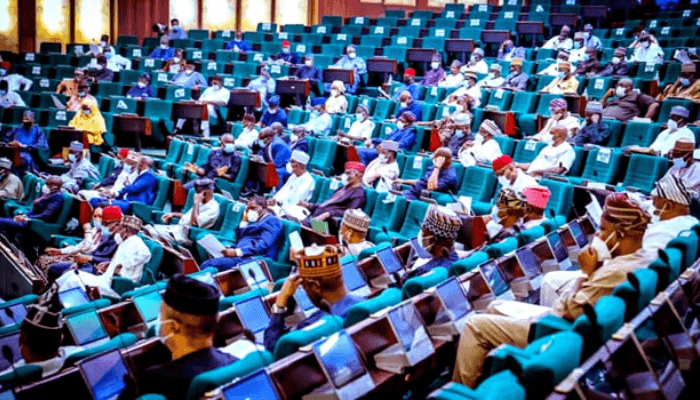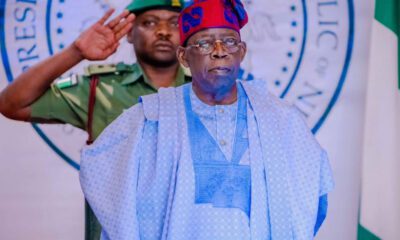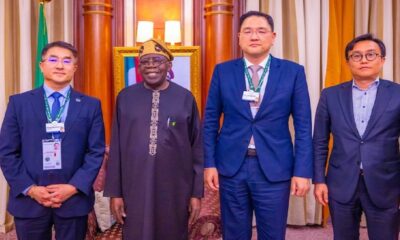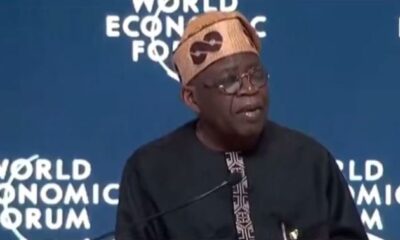News
Tinubu orders probe into alleged N585m financial misappropriation rocking Humanitarian Ministry
President Tinubu has ordered an investigation into the alleged N585m financial misappropriation rocking the Humanitarian Ministry.
In a viral document signed by her and directed to the Office of the Accountant-General of the Federation, Edu directed the disbursement of N585.189 million into one Bridget Mojisola Oniyelu’s private account.
The leaked document revealed that the money was paid into Oniyelu’s account.
The minister had, in a statement on Friday by her Special Assistant on Media and Publicity, Rasheed Zubair, said the payment followed due process.
Zubair explained that the money was paid into Oniyelu’s account because she currently serves as the project accountant of Grants for Vulnerable Groups. He said it is legal in the civil service for a staff member to be paid, use the same funds legally and retire same with all receipts and evidence after the project or programme is completed.
In a statement yesterday, Mohammed Idris, the Honorable Minister of Information and National Orientation of Nigeria noted that the President acknowledged the concerns raised by the public regarding the alleged payment of funds into a private account by the Ministry of Humanitarian Affairs and Poverty Alleviation.
“We are aware of the narratives circulating widely and wish to assure Nigerians that the Government takes these issues most seriously.”
He explained that President Bola Ahmed Tinubu has directed that a thorough and comprehensive investigation be conducted to ascertain the accuracy and validity of the reported details.
“The President is transparent and accountable to the people, and committed to ensuring that public funds are allocated and utilized effectively and efficiently to address the needs of Nigerians.
“The government is determined to unravel the truth as it relates to this matter, and assures that appropriate action will be taken to ensure that any breaches and infractions are identified and decisively punished, in line with the Administration’s commitment to public accountability and due process.
“The public is advised to note, against the backdrop of various unverified narratives circulating on the Internet, that the Ministry of Information and National Orientation, under the leadership of Minister Mohammed Idris, is the primary source for verified information about events and actions of the Federal Government of Nigeria.
“Only accurate details will be shared with the public. The Ministry is committed to providing timely updates to keep Nigerians informed about the progress of the investigation.
“We urge Nigerians to exercise patience as the investigation unfolds. The government is focused on ensuring a fair and unbiased process, and the findings will be communicated duly and transparently to the public,” the Minister said.
Meanwhile, the Socio-Economic Rights and Accountability Project (SERAP) has called on President Bola Tinubu to direct the Attorney General of the Federation and Minister of Justice Mr Lateef Fagbemi (SAN) and appropriate anti-corruption agencies to promptly and thoroughly probe the alleged payment by the Minister of Humanitarian Affairs, Betta Edu of N585.2 million meant for disbursement to vulnerable people in Akwa Ibom, Cross River, Lagos, and Ogun states into a private account.
SERAP urged the President “to direct Mr Fagbemi and appropriate anti-corruption agencies to promptly and thoroughly investigate whether the N585.2 million has been paid into any private account, and to identify and publish the names of anyone who may have received the money.”
SERAP said, “Anyone suspected to be involved in any improper payment or diversion of public funds should be brought to justice and any diverted public funds returned to the public treasury and paid directly to the rightful beneficiaries.”
In the letter dated 6 January 2024 and signed by SERAP deputy director Kolawole Oluwadare, the organisation said: “Paying public funds into private accounts may create the perception or appearance of impropriety and give cover to any potential wrongdoing or diversion.”
According to SERAP, “Investigating these allegations and ensuring that the public funds meant to take care of the poor are transparently and accountably spent and recovering any diverted public funds are serious and legitimate public interests.”
The letter read in part: “The public interests in safeguarding against the perception or appearance of impropriety or corruption also require your government to remove the opportunity for abuse inherent in the payment of public funds into private accounts.
“The Nigerian Constitution 1999 [as amended], the country’s financial regulations and international obligations impose a fundamental obligation on your government to ensure transparency and accountability in the spending of public funds meant for socially and economically vulnerable Nigerians.
“Your government has a legal responsibility to ensure full compliance with the Financial Regulations 2009, prohibiting the payment of public funds into private accounts, to reduce vulnerability to corruption or risks of the funds being diverted for personal ends or other unlawful purposes.
“Government officials hold positions of public trust. Public officials are expected to ensure compliance with Nigerian laws and international standards in the discharge of their public functions.
“The persistent lack of transparency and accountability in the spending of public funds meant to take care of the poor raises issues of public trust, makes the funds vulnerable to corruption or mismanagement, and undermines the integrity of poverty intervention programmes.
“Your government has a legal obligation to probe and prosecute allegations of abuse of office and corruption in the spending of public funds meant to improve the conditions of vulnerable Nigerians.
“SERAP is concerned that successive governments have failed to ensure transparency and accountability in the spending of public funds budgeted for social safety-nets and poverty alleviation programmes and projects.
“Any risks of corruption in the spending of public funds meant to take care of the poor would erode the effectiveness of the government’s oft-repeated commitment to address the impact of the removal of fuel subsidy on vulnerable Nigerians.
“We would be grateful if the recommended measures are taken within 7 days of the receipt and/or publication of this letter. If we have not heard from you by then, SERAP shall consider appropriate legal actions to compel your government to comply with our request in the public interest.
“Any failure to investigate these grave allegations, bring suspected perpetrators to justice and recover any diverted public funds would undermine the integrity of the government’s poverty intervention programmes.
“It would also create cynicism, and eventually citizens’ distrust about the ability of your government to prevent corruption or the appearance of corruption in the programmes.
“Nigerians have the right to be free from poverty. Any risks of diversion of public funds budgeted to lift vulnerable Nigerians out of poverty would pose both direct and indirect threats to human rights, and exacerbate extreme poverty in the country.
“It would also undermine your government’s legal obligations to effectively and progressively address and combat extreme poverty as a matter of human rights.
“SERAP also urges you to direct Betta Edu to publish details of spending of public funds drawn from the account of the National Social Investment Program (NSIPA), an agency under the Ministry of Humanitarian Affairs and Poverty Allegation, including the names of beneficiaries and details of the amounts received by them since 29 May 2023.
“SERAP urges you to instruct the Economic and Financial Crimes Commission (EFCC) and Independent Corrupt Practices and Other Related Offences Commission (ICPC) to jointly track and monitor the spending of any public funds drawn from the account(s) of the National Social Investment Program (NSIPA).
“According to our information, the Minister of Humanitarian Affairs, Betta Edu, in a memo dated 20 December 2023 reportedly requested the Accountant General of the Federation, Oluwatoyin Madein, to transfer public fund – N585.2 million – into a private account of an official in her ministry.
“According to the memo, the money was transferred from the National Social Investment Program office account and is meant for disbursement to vulnerable people in Akwa Ibom, Cross River, Lagos, and Ogun states, under the federal government poverty intervention project called Grants for Vulnerable Groups. N219.4 million is to be transferred to the vulnerable people in Akwa Ibom State, N73.8 million to Cross River State, N219.4 million to Lagos State, and N72.4 million to Ogun State.
“SERAP is seriously concerned that years of allegations of corruption and mismanagement in the spending of public funds meant to support and assist vulnerable Nigerians and entrenched impunity of perpetrators have undermined the ability of successive governments to support those most in need.
“Section 15(5) imposes the responsibility on your government to ‘abolish all corrupt practices and abuse of power’ in the country.
“Under Section 16(1) of the Constitution, your government has a responsibility to ‘secure the maximum welfare, freedom and happiness of every citizen on the basis of social justice and equality of status and opportunity.’ Section 16(2) further provides that, ‘the material resources of the nation are harnessed and distributed as best as possible to serve the common good.’
“Chapter 7, Section 713 of the Federal Government’s Financial Regulations 2009, provides: ‘Personal money shall in no circumstances be paid into a government bank account, nor shall any public money be paid into a private account.’
“Articles 5 and 9 of the UN Convention against Corruption also impose legal obligations on your government to ensure proper management of public affairs and public funds, and to promote sound and transparent administration of public affairs.”
News
Tinubu targets increased gas production, unveils plants in Delta, Imo


President Bola Tinubu will commission three critical gas infrastructure projects undertaken by the Nigerian National Petroleum Company Limited and its partners.
They are the AHL Gas Processing Plant 2 in Delta State, the ANOH Gas Processing Plant, and the ANOH-OB3 CTMS Gas Pipeline Projects in Imo State. The gas projects have a combined estimated output of 1,400 million standard cubic feet per day.
Special Adviser to the President on Media and Publicity, Ajuri Ngelale, disclosed this in a statement he signed Friday titled ‘President Tinubu to commission critical gas infrastructure projects.’
“The projects support the federal government’s effort to grow value from the nation’s gas assets while eliminating gas flaring…and deepen domestic gas supply as a critical enabler for economic prosperity,” said Ngelale.
The AHL Gas Processing Plant 2 is an expansion to the Kwale Gas Processing Plant, which currently supplies about 130MMscf/d of gas to the domestic market.
The processing plant is designed to process 200MMscf/d of rich gas and deliver lean gas through the OB3 Gas Pipeline. However, the facility already injecting gas is scheduled to ramp up to 180mmscfd by the end of May.
Ngelale said this additional gas supply will “support further rapid industrialisation of Nigeria” and also “produce about 160,000 MTPA of Propane and 100,000 MTPA of Butane, which will reduce the dependency on LPG Imports.”
The AHL Gas Plant is being developed by AHL Limited, an incorporated Joint Venture owned by NNPC Limited and SEEPCO.
Meanwhile, the ANOH gas plant is an integrated 300MMscf/d capacity gas processing plant designed to process non-associated gas from the Assa North-Ohaji South field in Imo State.
The plant will produce dry gas, condensate, and LPG. The gas from the ANOH plant will significantly increase the domestic gas supply, leading to increased power generation and accelerated industrialisation.
The ANOH Gas Plant is being developed by ANOH Gas Processing Company, an incorporated Joint Venture owned by NNPC Limited and Seplat Energy Plc on a 50-50 basis.
With the facility mechanically completed in December 2023, the NNPC says it is finalising pre-commissioning activities.
Third is the ANOH-OB3 CTMS Gas Pipeline Project, which the Presidency said involves the engineering, procurement, and construction of 36”x23.3km ANOH-OB3 Project.
“The Transmission Gas Pipeline will evacuate dry gas from the Assa North-Ohaji South primary treatment facility to the OB3 Custody Transfer Metering Station for delivery into the OB3 pipeline system,” read the statement.
About 600MMscf/d is estimated to be available from two separate 2 x 300MMscf/d capacity gas processing production trains from AGPC & SPDC JV.
The 23.3km Anoh-OB3 PPL is scheduled for mechanical completion by May 15, 2024.
When commissioned, the projects will increase gas supply to the domestic market by approximately 500mmscf/d, creating a better investment climate and promoting balanced economic growth cumulatively, the Presidential Spokesman affirmed
News
House of Reps to review laws, practices restricting press freedom


The House of Representatives said on Friday that it would review the laws and practices restricting press freedom and the ability of the media to carry out its constitutional role in the country.
Rep. Akin Rotimi, Chairman, House Committee on Media and Public Affairs, said this while delivering a keynote address, to mark the 2024 World Press Freedom Day organised by the Konrad Adenauer Stiftung, Nigeria.
Rotimi said the legislature would prepare the ground for journalists to operate without any hindrance provided they adhere to the tenets of their profession.
“We will enhance good governance practices, transparency and
accountability through media chats, public hearings, town hall meetings, etc., amongst other scheduled legislative actions in Agenda 6,” he said.
The International Press Freedom Day, celebrated every May 3, is a day of reflection among media professionals and stakeholders on issues of press freedom and professional ethics.
Rotimi said that the 10th House of Representatives led by Speaker Tajudeen Abbas, had resolved to work with the media to ensure a successful running of the present government.
He said that the 1999 Constitution of the Federal Republic of Nigeria (as amended) conferred on the press a critical role as contained in Section 22 regarding obligations of the mass media.
“The role states that the press, radio, television and other agencies of the mass media shall at all times be free to uphold the fundamental objectives in this chapter and uphold the responsibility and accountability of the government to the people.
“Amongst many other challenges in the course of the discharge of this constitutional mandate, the press faces a disproportionate exposure to harm in the face of the widespread insecurity challenges in the country.
“There are also issues around the dearth of funding but I call on all stakeholders to continue with concerted efforts to address these challenges.
“There is no gainsaying that there are many miles to cover as far as media freedoms in our country is concerned but we have greatly improved from the days of military intervention in our polity (particularly, 1983 – 1998),” Rotimi added.
He urged the media to encourage introspection and self-regulation, and also look at the self-defeating ways that the press delegitimises their own struggle by not upholding ethics, and address them.
Mr Lukas Laible, Deputy Resident Representative, Konrad Adenauer Stiftung, Nigeria, said the press had become the enabler of Nigerian democracy.
“May 3 of every year is an important day for journalists as freedom of speech is the beacon of the practice.
“Without freedom of speech there won’t be freedom of press, and without freedom of the press, no society can be free.
“Journalists don’t just cover events, they are the people’s transmitter and they show capability in handling issues. They hold political leaders accountable and that is what makes democracy viable.
“Holding political leaders accountable enhances good governance. If the press fails to hold the government accountable, it will deviate from the people,” Laible said.
According to him, the press is so much trusted by the people and as such must make the people know the value of a free world.
Mrs Franca Aiyetan, Secretary, Nigerian Broadcasting Commission (NBC), who spoke during a panel session, urged journalists to always do their job in a way that would not consume the people.
Aiyetan, while speaking on the theme “Navigating the Intersection of Media Regulations, Press Freedom Advocacy and Ethical Journalism in the Face of Environmental Crises”, noted that NBC was established to have a formidable Nigerian media.
She said that NBC was not established as an attack dog for the government and as such would want the press to always work with it.
“If a detail about a truth will set two tribes against each other, then, there is something wrong with that truth.”
Another panelist, Mrs Mojirayo Ogunlana, the Executive Director, Digicivic Initiative, said journalists needed laws that should protect them while discharging their job.
“Threats to the lives of journalists should be declared as a state of emergency,” Ogunlana added.
She urged media practitioners to self-regulate themselves to prevent the government from exploiting any vacuum that could give it the opportunity to pounce on them.
News
Stop using repressive laws to intimidate journalists – SERAP, NGE tell FG


The Socio-Economic Rights and Accountability Project, SERAP, and Nigeria Guild of Editors, NGE, have called on Nigerian authorities at all levels of government to stop using repressive and anti-media laws to target, intimidate and harass journalists, critics and media houses.
The groups made the demand after an interactive session on ‘the state of press freedom in Nigeria’ held at the Radisson Blu Hotel in Ikeja.
In a joint statement, SERAP and NGE said that, “the government of President Bola Tinubu, the country’s 36 governors and FCT minister must now genuinely uphold press freedom, ensure access to information to all Nigerians, obey court judgments, and respect the rule of law”.
They expressed concerns about the escalating crackdown on the right to freedom of expression and media freedom and the flagrant disregard for the rule of law by authorities at all levels of government.
The groups note that the suppression of the press in recent times takes various forms ranging from extrajudicial to unlawful detentions, disappearances, malicious prosecutions and wrongful use of both legislation and law enforcement.
The statement read in part: “We would continue to speak truth to power and to hold authorities to account for their constitutional and international obligations including on freedom of expression and media freedom.
“Nigeria as a country has a long and unpleasant history of press gagging and clampdown on media freedom, which is evidence of extensive state censorship of media and in some cases, the utter control of state-owned media houses.
“This position has not changed considerably despite almost 25 years of unbroken democratic rule in the Fourth Republic.”
-
capital market2 years ago
Rt.briscoe, FBNH, Others halts negative performance of stock market
-
Finance3 months ago
Court orders Sen. Victor Umeh to repay N136m bank debt to AMCON
-



 Abuja Update2 months ago
Abuja Update2 months agoUNDP, FG partnership needed to achieve inclusion, equity- Minister
-
Abuja Update1 month ago
Banks drive stock market performance with N147bn gain
-



 Business2 weeks ago
Business2 weeks agoTingo Group unveils Tingo Electric, Tingo Cola drink at Lagos launch
-



 Health2 weeks ago
Health2 weeks agoCapacity training will reduce migration of health workers- NPHCDA
-
News4 months ago
Oil thieves sponsoring malicious media campaign against Navy – Spokesman
-



 Infotech1 month ago
Infotech1 month agoWorld Backup Day: NITDA urges Nigerians to ensure backup of data











